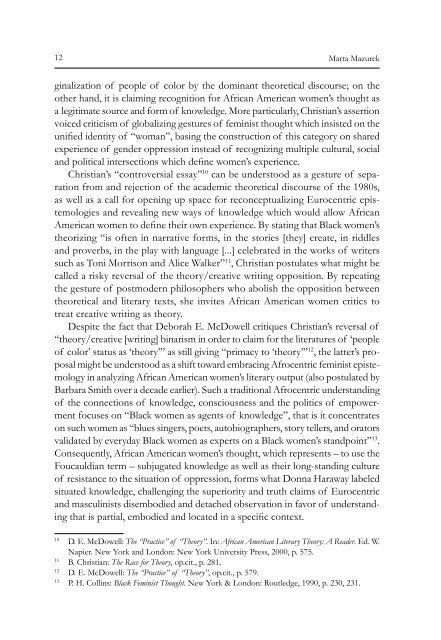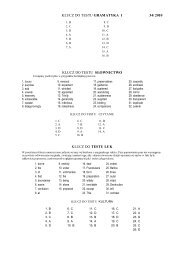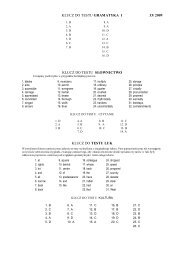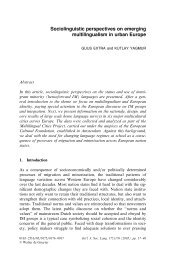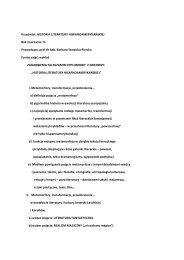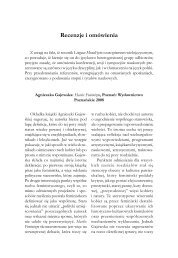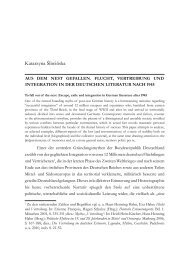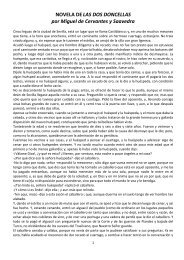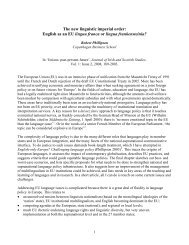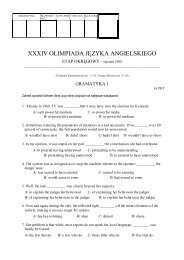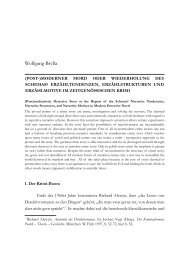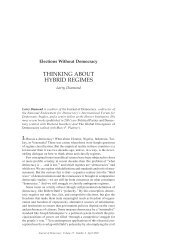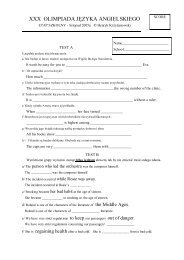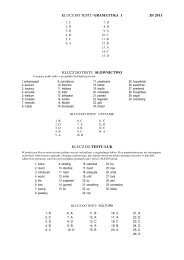African American women and feminism: Alice Walker's womanism ...
African American women and feminism: Alice Walker's womanism ...
African American women and feminism: Alice Walker's womanism ...
You also want an ePaper? Increase the reach of your titles
YUMPU automatically turns print PDFs into web optimized ePapers that Google loves.
12 Marta Mazurek<br />
ginalization of people of color by the dominant theoretical discourse; on the<br />
other h<strong>and</strong>, it is claiming recognition for <strong>African</strong> <strong>American</strong> <strong>women</strong>’s thought as<br />
a legitimate source <strong>and</strong> form of knowledge. More particularly, Christian’s assertion<br />
voiced criticism of globalizing gestures of feminist thought which insisted on the<br />
unified identity of “woman”, basing the construction of this category on shared<br />
experience of gender oppression instead of recognizing multiple cultural, social<br />
<strong>and</strong> political intersections which define <strong>women</strong>’s experience.<br />
Christian’s “controversial essay” 10 can be understood as a gesture of separation<br />
from <strong>and</strong> rejection of the academic theoretical discourse of the 1980s,<br />
as well as a call for opening up space for reconceptualizing Eurocentric epistemologies<br />
<strong>and</strong> revealing new ways of knowledge which would allow <strong>African</strong><br />
<strong>American</strong> <strong>women</strong> to define their own experience. By stating that Black <strong>women</strong>’s<br />
theorizing “is often in narrative forms, in the stories [they] create, in riddles<br />
<strong>and</strong> proverbs, in the play with language [...] celebrated in the works of writers<br />
such as Toni Morrison <strong>and</strong> <strong>Alice</strong> Walker” 11 , Christian postulates what might be<br />
called a risky reversal of the theory/creative writing opposition. By repeating<br />
the gesture of postmodern philosophers who abolish the opposition between<br />
theoretical <strong>and</strong> literary texts, she invites <strong>African</strong> <strong>American</strong> <strong>women</strong> critics to<br />
treat creative writing as theory.<br />
Despite the fact that Deborah E. McDowell critiques Christian’s reversal of<br />
“theory/creative [writing] binarism in order to claim for the literatures of ‘people<br />
of color’ status as ‘theory’” as still giving “primacy to ‘theory’” 12 , the latter’s proposal<br />
might be understood as a shift toward embracing Afrocentric feminist epistemology<br />
in analyzing <strong>African</strong> <strong>American</strong> <strong>women</strong>’s literary output (also postulated by<br />
Barbara Smith over a decade earlier). Such a traditional Afrocentric underst<strong>and</strong>ing<br />
of the connections of knowledge, consciousness <strong>and</strong> the politics of empowerment<br />
focuses on “Black <strong>women</strong> as agents of knowledge”, that is it concentrates<br />
on such <strong>women</strong> as “blues singers, poets, autobiographers, story tellers, <strong>and</strong> orators<br />
validated by everyday Black <strong>women</strong> as experts on a Black <strong>women</strong>’s st<strong>and</strong>point” 13 .<br />
Consequently, <strong>African</strong> <strong>American</strong> <strong>women</strong>’s thought, which represents – to use the<br />
Foucauldian term – subjugated knowledge as well as their long-st<strong>and</strong>ing culture<br />
of resistance to the situation of oppression, forms what Donna Haraway labeled<br />
situated knowledge, challenging the superiority <strong>and</strong> truth claims of Eurocentric<br />
<strong>and</strong> masculinists disembodied <strong>and</strong> detached observation in favor of underst<strong>and</strong>ing<br />
that is partial, embodied <strong>and</strong> located in a specific context.<br />
10<br />
D. E. McDowell: The “Practice” of “Theory”. In: <strong>African</strong> <strong>American</strong> Literary Theory: A Reader. Ed. W.<br />
Napier. New York <strong>and</strong> London: New York University Press, 2000, p. 575.<br />
11<br />
B. Christian: The Race for Theory, op.cit., p. 281.<br />
12<br />
D. E. McDowell: The “Practice” of “Theory”, op.cit., p. 579.<br />
13<br />
P. H. Collins: Black Feminist Thought. New York & London: Routledge, 1990, p. 230, 231.


